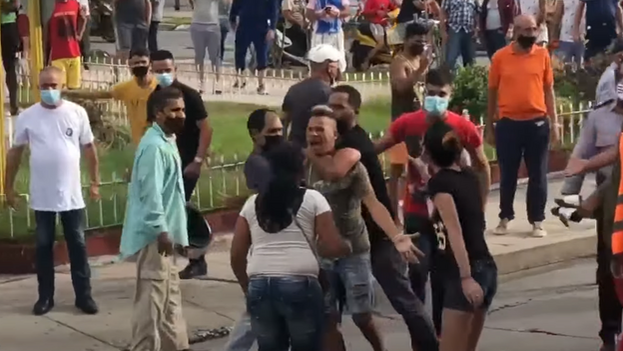
![]() 14ymedio, Havana, 23 January 2023 — The opposition platform D Frente [D Front] thanked the European Union on Monday for having met with the Cuban Minister of Justice, Oscar Silvera, last Wednesday, and for having addressed the sentences of the protesters on July 11, 2021.
14ymedio, Havana, 23 January 2023 — The opposition platform D Frente [D Front] thanked the European Union on Monday for having met with the Cuban Minister of Justice, Oscar Silvera, last Wednesday, and for having addressed the sentences of the protesters on July 11, 2021.
“We see this gesture of solidarity, not as a feeling of compassion for the misfortune of others, but as a firm and persevering commitment to respect human rights in Cuba,” says the organization in an open letter addressed to Josep Borrell, High Representative of the European Union for Foreign Affairs and Security Policy.
In this letter, the platform explains that the possible repercussions of the new Penal Code, which came into force last December, and which provides for tougher penalties for protesters, dissidents and activists, were also discussed. Instead, they note that the Cuban Constitution includes the possibility of granting pardons and amnesties.
Specifically, article 108 allows the National Assembly of People’s Power to grant amnesties, and article 128 empowers the President to grant pardons and to request the National Assembly to grant amnesties. This possibility is also implemented, continues D Frente, through laws No. 131/2019 and No. 136/2020.
The Island’s Minister of Justice maintained at the meeting, according to the EFE agency, that there is no “legal possibility” of an amnesty in Cuba and he did not commit himself to anything, although he noted “the request for pardon” from the European Union.
Similarly, Silvera described the meeting in a statement as a “sincere, open, respectful and profitable conversation.”
Cuba’s Ministry of Foreign Affairs explained that the meeting took place to “give continuity to the bilateral political dialogue” within the Political Dialogue, the “governing instrument” of relations between Cuba and the European bloc in force since 2017.
D Frente, born from a concentration of different dissident organizations, reiterates in its text its gratitude to the EU “for immediately and unconditionally releasing political prisoners,” despite acknowledging that the Cuban government “does not have the will to put an end to the political prison and uses these as a bargaining chip in its negotiations with other actors.”
____________
COLLABORATE WITH OUR WORK: The 14ymedio team is committed to practicing serious journalism that reflects Cuba’s reality in all its depth. Thank you for joining us on this long journey. We invite you to continue supporting us by becoming a member of 14ymedio now. Together we can continue transforming journalism in Cuba.
